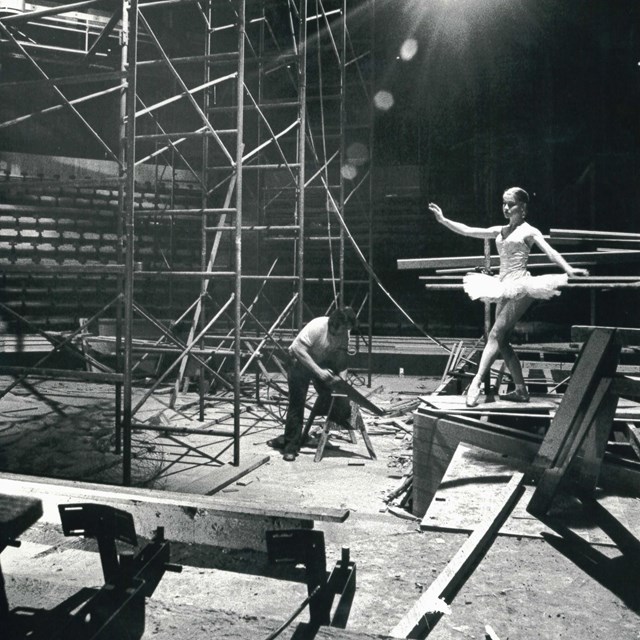A play fit for a king
Five intriguing facts about Macbeth, Shakespeare’s shortest, sharpest tragedy
Macbeth is one of Shakespeare’s most immersive and haunting plays, following a doomed husband and wife on their murderous ascent to greatness.
Sport for Jove’s brand new production of Macbeth opens at the Seymour this May, so we thought we’d take a deeper look at the origins and history of this legendary drama, and unearth some interesting facts you might not have heard before.
Fit for a king
Shakespeare is thought to have written Macbeth for King James I, a theatre enthusiast who took up patronage of the Bard’s acting troupe, the King’s Men, shortly after his arrival in London in 1603.
Macbeth is set in James’s native Scotland, features the king’s real-life ancestor, Banquo, and was likely performed for the very first time before the king, during a 1606 appointment at court that saw the King’s Men present three plays for James and other aristocrats.
Double, double toil and trouble...
James I was famously fascinated by witchcraft, even writing a book, Daemonologie, on the subject, and many of the witchcraft scenes in Macbeth specifically reflect the king’s own beliefs—including his conviction that witches could vanish, take flight, and raise storms.
But did Shakespeare include these scenes to please the king or to subtly mock his obsession? To this day, scholars aren’t certain…
Short and sweet
Despite containing five acts, 21 scenes, and 17,121 words, Macbeth is the shortest of all Shakespeare’s tragedies.
The play wasn’t officially published until 1623, some 17 years after it was written, and scholars believe portions of the original text were lost in the interim, resulting in the shortened version we know today.
However, many Macbeth fans say its short, sharp scenes make the play uniquely engrossing, creating palpable tension and building towards the dramatic final act.
The Scottish Play
According to folklore, Macbeth is cursed, with some believing Shakespeare took his witches’ spells from real black magic books and that the curse stems from this.
Another legend claims that the first actor to play Lady Macbeth passed away just as the show was due to open, and that his spirit haunts all other performances.
Many other productions of the play have indeed been marred by tragedy, from on-stage deaths to audience riots—but legend has it that the Macbeth curse can be thwarted by never uttering the play’s name aloud, instead referring to it simply as ‘The Scottish Play’.
The highest form of flattery
The famous idiom, ‘To steal someone’s thunder’, originates from a comment made by 18th century English dramatist, John Dennis, during a performance of Macbeth.
For his 1709 play, Appius and Virginia, Dennis developed an innovative thunder effect using sheets of tin—and while the play was not well received, the thunder sound was.
Some time later, when attending a production of Macbeth at the very same theatre that had quickly withdrawn Appius and Virginia, Dennis heard his distinctive thunder sound being used without consultation, and is said to have leapt from his seat and shouted, ‘They will not let my play run, but they will steal my thunder!’
Fighting for good
Damien Ryan, Sport for Jove’s Artistic Director, appreciates Macbeth for many reasons, not least its complex characters and contemporary relevance.
‘I love the atmosphere in Macbeth, the sounds in the language, the soundscapes it provokes in the mind—but oddly what I love most is how good the people are in that play,’ Damien says.
‘It is seen as such a meditation on blood and pure evil, [but] it is actually a play populated with astonishingly brave and moral people. The majority of the characters are in fact fighting for good, risking everything, trying to live under and eventually bring down a tyrant while their country bleeds around them. It lands very hard upon our current moment…’
Find out more about Sport for Jove’s upcoming production of Macbeth here, and if you have any fun facts about this legendary play, let us know! We’d love to hear them.
Image credit: Seiya Taguchi
5 April 2022
Sport for Jove's acclaimed Macbeth is an ecstatic vision of what love and ambition can do to people, of ghosts, shadows, and the terrors of the imagination.
BUY TICKETSMacbeth is one of Shakespeare’s most immersive and haunting plays, following a doomed husband and wife on their murderous ascent to greatness.
Sport for Jove’s brand new production of Macbeth opens at the Seymour this May, so we thought we’d take a deeper look at the origins and history of this legendary drama, and unearth some interesting facts you might not have heard before.
Fit for a king
Shakespeare is thought to have written Macbeth for King James I, a theatre enthusiast who took up patronage of the Bard’s acting troupe, the King’s Men, shortly after his arrival in London in 1603.
Macbeth is set in James’s native Scotland, features the king’s real-life ancestor, Banquo, and was likely performed for the very first time before the king, during a 1606 appointment at court that saw the King’s Men present three plays for James and other aristocrats.
Double, double toil and trouble...
James I was famously fascinated by witchcraft, even writing a book, Daemonologie, on the subject, and many of the witchcraft scenes in Macbeth specifically reflect the king’s own beliefs—including his conviction that witches could vanish, take flight, and raise storms.
But did Shakespeare include these scenes to please the king or to subtly mock his obsession? To this day, scholars aren’t certain…
Short and sweet
Despite containing five acts, 21 scenes, and 17,121 words, Macbeth is the shortest of all Shakespeare’s tragedies.
The play wasn’t officially published until 1623, some 17 years after it was written, and scholars believe portions of the original text were lost in the interim, resulting in the shortened version we know today.
However, many Macbeth fans say its short, sharp scenes make the play uniquely engrossing, creating palpable tension and building towards the dramatic final act.
The Scottish Play
According to folklore, Macbeth is cursed, with some believing Shakespeare took his witches’ spells from real black magic books and that the curse stems from this.
Another legend claims that the first actor to play Lady Macbeth passed away just as the show was due to open, and that his spirit haunts all other performances.
Many other productions of the play have indeed been marred by tragedy, from on-stage deaths to audience riots—but legend has it that the Macbeth curse can be thwarted by never uttering the play’s name aloud, instead referring to it simply as ‘The Scottish Play’.
The highest form of flattery
The famous idiom, ‘To steal someone’s thunder’, originates from a comment made by 18th century English dramatist, John Dennis, during a performance of Macbeth.
For his 1709 play, Appius and Virginia, Dennis developed an innovative thunder effect using sheets of tin—and while the play was not well received, the thunder sound was.
Some time later, when attending a production of Macbeth at the very same theatre that had quickly withdrawn Appius and Virginia, Dennis heard his distinctive thunder sound being used without consultation, and is said to have leapt from his seat and shouted, ‘They will not let my play run, but they will steal my thunder!’
Fighting for good
Damien Ryan, Sport for Jove’s Artistic Director, appreciates Macbeth for many reasons, not least its complex characters and contemporary relevance.
‘I love the atmosphere in Macbeth, the sounds in the language, the soundscapes it provokes in the mind—but oddly what I love most is how good the people are in that play,’ Damien says.
‘It is seen as such a meditation on blood and pure evil, [but] it is actually a play populated with astonishingly brave and moral people. The majority of the characters are in fact fighting for good, risking everything, trying to live under and eventually bring down a tyrant while their country bleeds around them. It lands very hard upon our current moment…’
Find out more about Sport for Jove’s upcoming production of Macbeth here, and if you have any fun facts about this legendary play, let us know! We’d love to hear them.
Image credit: Seiya Taguchi
5 April 2022
Sport for Jove's acclaimed Macbeth is an ecstatic vision of what love and ambition can do to people, of ghosts, shadows, and the terrors of the imagination.
BUY TICKETS



